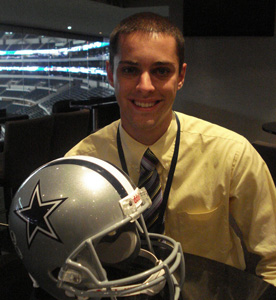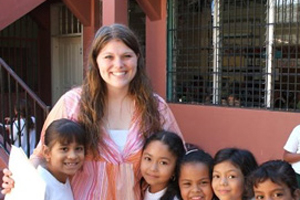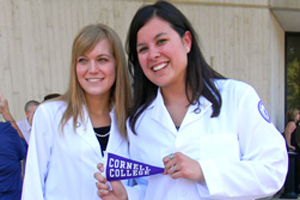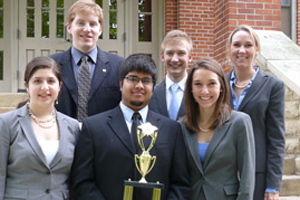Dreams comes true
Imagine a young you dreaming of a career in, let’s say, sports management. One day you wake up and instead of heading to a Hilltop classroom, you find yourself south, deeply south, under a dome that will be your classroom for the next three months—Cowboys Stadium in Arlington, Texas.

Under this sparkling new dome—the largest in the world—you are a Cornell Fellow whose teachers include the owner of the nation’s richest sports franchise, the Dallas Cowboys. Your hero, linebacker DeMarcus Ware, says hi to you on the practice field, leaving you in a stuttering stupor. After “class” one Sunday night, a loss to the Chicago Bears, you go home and find an inbox message that could change your life.
” … I had an e-mail from the Texas Rangers vice president asking about times for lunch!!!! We are not going to meet until after the season because of how busy things are with them due to the playoffs coming up, but this is a fantastic opportunity for me! I’m very excited to have the opportunity to talk with him,” gushed Andrew Kinn ’12 on his weekly blog, one of the requirements for his Riesen Fellowship this fall in Sports Management.
“In sports marketing that’s as good as you can get. That’s like going to the Harvard in sports marketing,” said Dean Riesen ’79, a trustee, campaign steering committee member, and the mastermind behind the 5-year-old Cornell Fellows program, a high-level internship program at Cornell that, thus far, has sent 158 students, expenses paid by generous alumni, into the very jobs they’ve dreamt about, with the promise of mentoring by the professionals they aspire to one day be. Most Fellowships are created through the Cornell network—in this case it was Eric Sudol ’03, director of luxury suite sales for the Dallas Cowboys.
Riesen’s inspiration for the Fellows program came in his senior year at Cornell, when One Course At A Time was introduced, and he seized the opportunity, taking an internship at Rockwell International in Cedar Rapids.
“This opportunity really launched my career,” Riesen said. So much so that during the Extraordinary Opportunities Campaign he made it a priority to help Cornell take full advantage of the potential for OCAAT to be blended with internships.
Throughout the Extraordinary Opportunities Campaign, the bricks and mortar projects were considered the essentials, the nuts and bolts that had to be done. But along the way, something less visible, but more transforming, materialized.
Hoping to maximize the uninterrupted stretches of OCAAT blocks, trustees and campaign committee members were inspired to invent, and fund, innovative academic opportunities for students that would work with the block plan schedule. The ideas began to rain. Then they poured.
The result? A college where the grass really is greener, a lush field of academia where students dream so big they have to pinch themselves from time to time. Because, quite often, that dream has become their reality.





